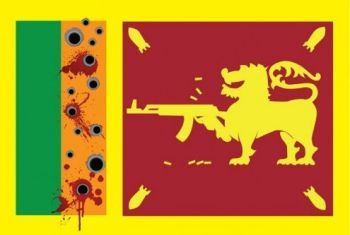
Publisher:
Bonnie King
CONTACT:
Newsroom@Salem-news.com
Advertising:
Adsales@Salem-news.com

~Truth~
~Justice~
~Peace~
TJP
Oct-30-2013 20:59

 TweetFollow @OregonNews
TweetFollow @OregonNews
Credible Sri Lankan War Crimes Investigation on the Horizon
Karunyan ArulananthamMore than two years after the Panel's report, the High Commissioner visited Sri Lanka for a week this past August and found, unsurprisingly, that nothing had changed.
 Sri Lanka continues human rights violations against Tamils. |
(TORONTO) - At the United Nations General Assembly's (UNGA) 68th session in late September, a major stipulation was laid out by UN High Commissioner on Human Rights, Navi Pillay, in reference to the shocking slaughtering of tens of thousands of Sri Lankan Tamil civilians in the spring of 2009.
Given strong evidence that Tamil civilians were killed primarily by government forces -- many in schools, hospitals and government-declared safe zones -- the High Commissioner called upon Sri Lanka to "use the time between now (September 2013) and March 2014 to engage in a credible national process with tangible results, including the successful prosecution of individual perpetrators, in the absence of which [the High Commissioner] believes the international community will have a duty to establish its own inquiry."
Such a strong statement that includes a concrete deadline has been sorely needed, because Sri Lanka has already received more than enough time to address the war crimes allegations through its own internal processes. In May 2009, soon after the fighting ceased, the Government of Sri Lanka and the UN Secretary-General, Ban Ki-moon, issued a joint statement underlining the importance of an accountability process. But after a full year, the government had failed to keep this commitment. In the face of this inaction, the Secretary-General appointed a Panel of Experts to examine Sri Lanka's compliance. The Panel concluded the following year there was "credible evidence" that the Government of Sri Lanka (as well as its opponent during the armed conflict, the Liberation Tigers of Tamil Eelam, or LTTE) had committed breaches of international humanitarian and human rights laws "some of which would amount to war crimes and crimes against humanity."
Now, more than two years after the Panel's report, the High Commissioner visited Sri Lanka for a week this past August and found, unsurprisingly, that nothing had changed. The Sri Lankan government has held no one accountable for the mass atrocities committed over four years ago. This, of course, only stands to reason since the current regime -- headed by President Mahinda Rajapaka and his brothers -- is among the accused for committing the 2009 atrocities.
Would anyone credibly ask Syrian President Assad to investigate his own army's use of chemical weapons? Of course not.
As the last four years have shown, repeated pronouncements by U.S. and numerous other officials recommending that Sri Lanka take proper action have done nothing to bring even the slightest measure of justice for the horrific crimes of 2009. Furthermore, the government continues to harass and kill journalists, allow Christian and Muslim religious communities to be attacked with impunity, confiscate land owned by Tamils, and maintain a massive military presence in Tamil areas, particularly in Sri Lanka's Northern Province. That, in turn, gives rise to sexual assaults, disappearances, and other crimes.
The High Commissioner's latest statement offers, at long last, much more than another request for action that is sure to fall on deaf ears. If the Sri Lankan government fails to act within the next six months, she says, the international community must do what the Sri Lankan government has not and establish an international accountability mechanism for the atrocities that occurred over four years ago.
Such a step would not only help to slow, or even reverse, Sri Lanka's descent into authoritarianism, but more importantly, it would vindicate the basic human rights principles that the international community purports to hold in the highest regard. The Secretary General's Panel of Experts observed that "the conduct of war represented a grave assault on the entire regime of international law designed to protect individual dignity during both war and peace." The international community cannot credibly condemn the mass killings in Syria, the Congo, and elsewhere while it continues to turn a blind eye to Sri Lanka's own atrocities of 2009. The High Commissioner's statement, and in particular, her fixed timeline, represent an important step in the right direction. Now the international community must prepare to follow through and show the world that its commitment to accountability for massive human rights violations is more than empty rhetoric.
Special thanks to Elias Jey and Tamil American Peace Initiative
First published by Huffington Post
 |
 |
 |
Articles for October 29, 2013 | Articles for October 30, 2013 | Articles for October 31, 2013
Quick Links
DINING
Willamette UniversityGoudy Commons Cafe
Dine on the Queen
Willamette Queen Sternwheeler
MUST SEE SALEM
Oregon Capitol ToursCapitol History Gateway
Willamette River Ride
Willamette Queen Sternwheeler
Historic Home Tours:
Deepwood Museum
The Bush House
Gaiety Hollow Garden
AUCTIONS - APPRAISALS
Auction Masters & AppraisalsCONSTRUCTION SERVICES
Roofing and ContractingSheridan, Ore.
ONLINE SHOPPING
Special Occasion DressesAdvertise with Salem-News
Contact:AdSales@Salem-News.com

googlec507860f6901db00.html



Terms of Service | Privacy Policy
All comments and messages are approved by people and self promotional links or unacceptable comments are denied.
[Return to Top]
©2025 Salem-News.com. All opinions expressed in this article are those of the author and do not necessarily reflect those of Salem-News.com.